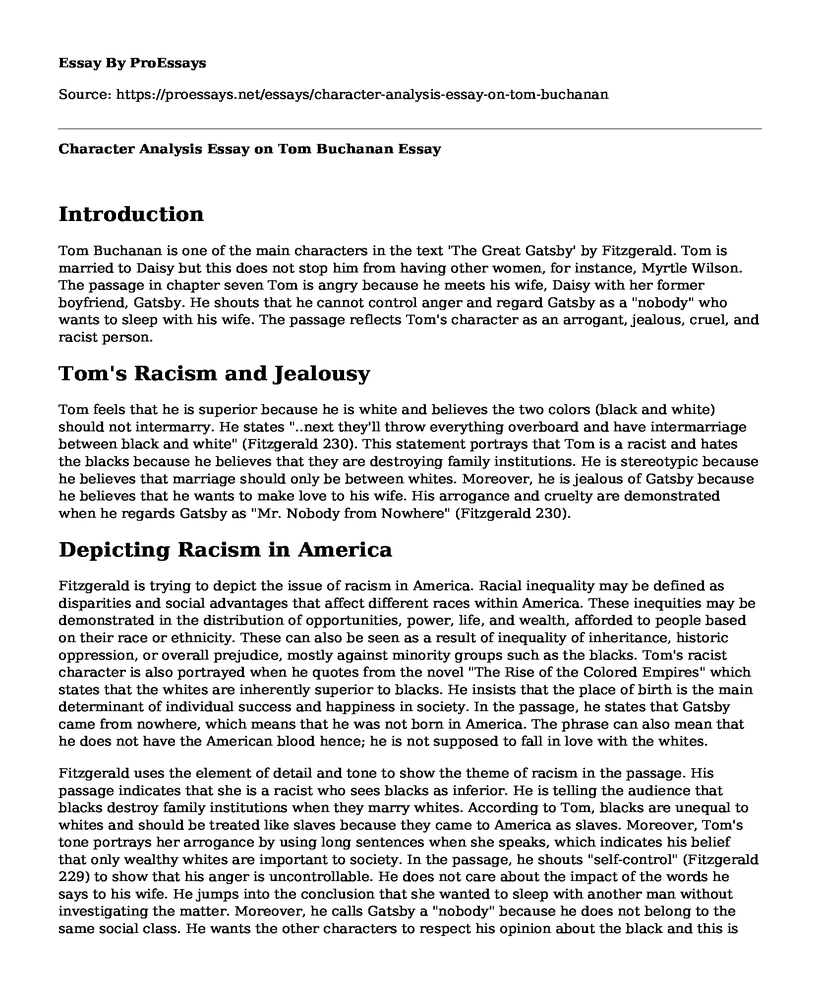Introduction
Tom Buchanan is one of the main characters in the text 'The Great Gatsby' by Fitzgerald. Tom is married to Daisy but this does not stop him from having other women, for instance, Myrtle Wilson. The passage in chapter seven Tom is angry because he meets his wife, Daisy with her former boyfriend, Gatsby. He shouts that he cannot control anger and regard Gatsby as a "nobody" who wants to sleep with his wife. The passage reflects Tom's character as an arrogant, jealous, cruel, and racist person.
Tom's Racism and Jealousy
Tom feels that he is superior because he is white and believes the two colors (black and white) should not intermarry. He states "..next they'll throw everything overboard and have intermarriage between black and white" (Fitzgerald 230). This statement portrays that Tom is a racist and hates the blacks because he believes that they are destroying family institutions. He is stereotypic because he believes that marriage should only be between whites. Moreover, he is jealous of Gatsby because he believes that he wants to make love to his wife. His arrogance and cruelty are demonstrated when he regards Gatsby as "Mr. Nobody from Nowhere" (Fitzgerald 230).
Depicting Racism in America
Fitzgerald is trying to depict the issue of racism in America. Racial inequality may be defined as disparities and social advantages that affect different races within America. These inequities may be demonstrated in the distribution of opportunities, power, life, and wealth, afforded to people based on their race or ethnicity. These can also be seen as a result of inequality of inheritance, historic oppression, or overall prejudice, mostly against minority groups such as the blacks. Tom's racist character is also portrayed when he quotes from the novel "The Rise of the Colored Empires" which states that the whites are inherently superior to blacks. He insists that the place of birth is the main determinant of individual success and happiness in society. In the passage, he states that Gatsby came from nowhere, which means that he was not born in America. The phrase can also mean that he does not have the American blood hence; he is not supposed to fall in love with the whites.
Fitzgerald uses the element of detail and tone to show the theme of racism in the passage. His passage indicates that she is a racist who sees blacks as inferior. He is telling the audience that blacks destroy family institutions when they marry whites. According to Tom, blacks are unequal to whites and should be treated like slaves because they came to America as slaves. Moreover, Tom's tone portrays her arrogance by using long sentences when she speaks, which indicates his belief that only wealthy whites are important to society. In the passage, he shouts "self-control" (Fitzgerald 229) to show that his anger is uncontrollable. He does not care about the impact of the words he says to his wife. He jumps into the conclusion that she wanted to sleep with another man without investigating the matter. Moreover, he calls Gatsby a "nobody" because he does not belong to the same social class. He wants the other characters to respect his opinion about the black and this is the reason why he uses a high tone.
Conclusion
In conclusion, the passage reflects Tom's character as a racist and arrogant man. His arrogance is demonstrated in his tone when he makes a false accusation against his wife. He also refers to Gatsby as a 'nobody' because he belongs to a low social class. Tom's detail shows he is racist because he believes that marriage between whites and blacks destroys family institutions.
Work Cited
Fitzgerald, Francis Scott. The Great Gatsby (1925). Na, 1995.
Cite this page
Character Analysis Essay on Tom Buchanan. (2022, Feb 12). Retrieved from https://proessays.net/essays/character-analysis-essay-on-tom-buchanan
If you are the original author of this essay and no longer wish to have it published on the ProEssays website, please click below to request its removal:
- Literary Essay Example on Faulkner's A Rose for Emily
- The Discord in the Imagery of Health and Death in Hamlet Essay
- The Duality of a Man with Enron and the Lord of Flies: Paper Example
- King Lear by William Shakespeare Essay Example
- Character Analysis Essay on Gatsby in 'The Great Gatsby'
- Essay Example on Social Realism in Literature: Common People, Stories, and Places
- Paper Example on True Love: Exploring Shakespeare's Iconic Sonnet 116







